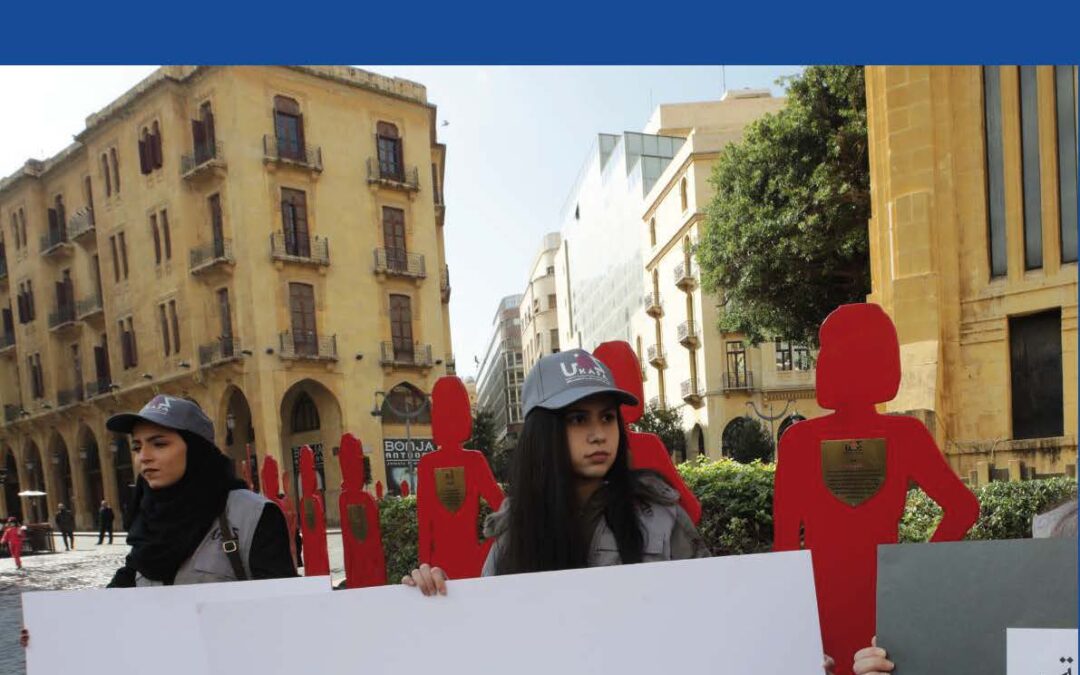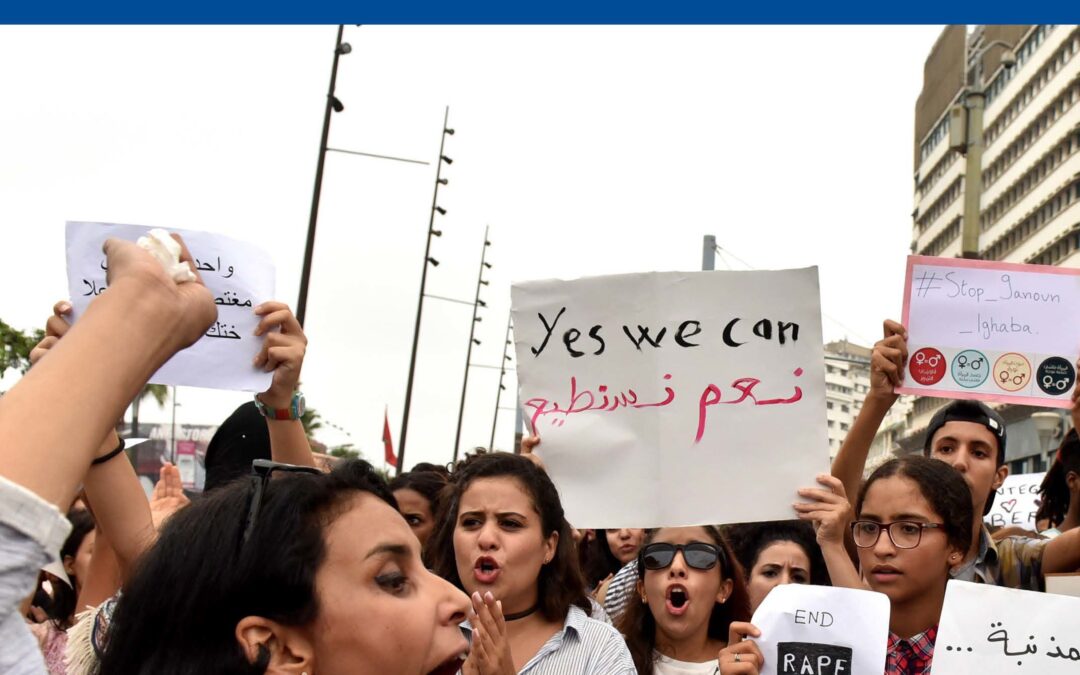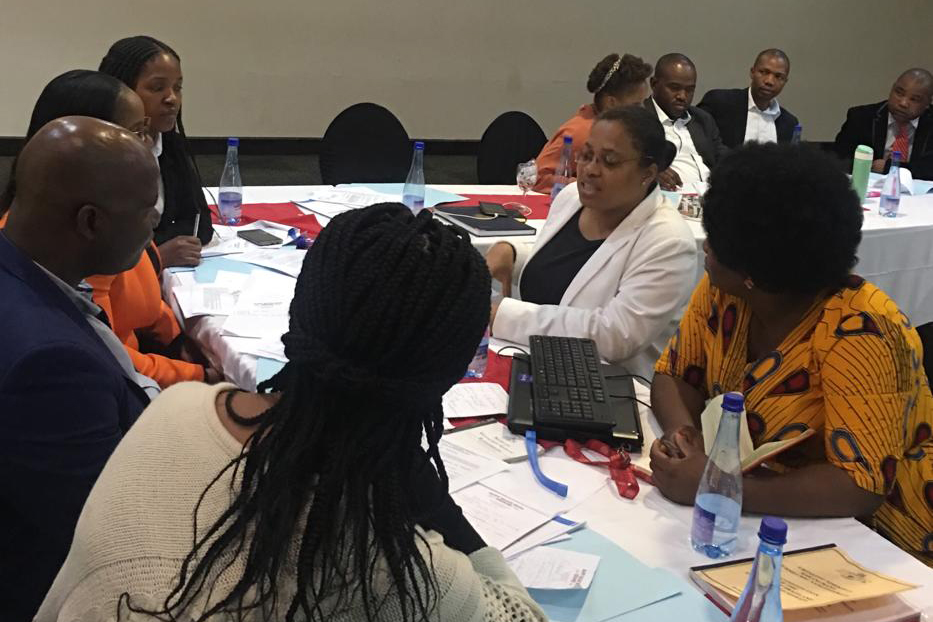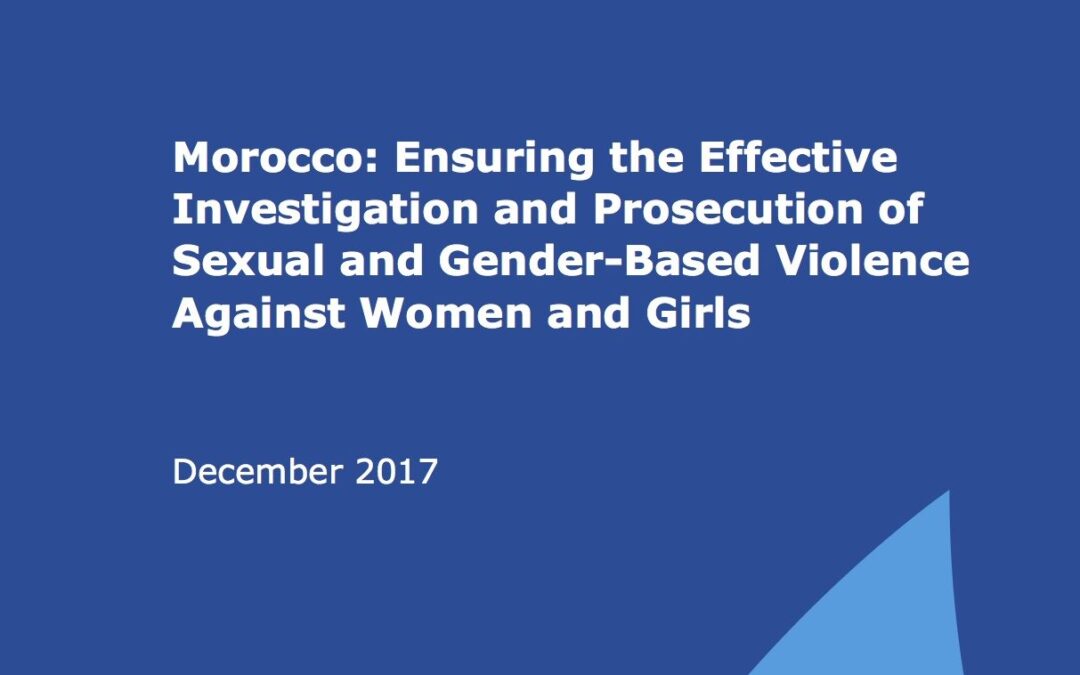
Jul 12, 2019 | News, Publications, Reports
In a report published today, the ICJ called on the Lebanese authorities to prevent, address and ensure accountability for all forms of gender-based violence (GBV) against women and girls, including by adopting legislative, judicial and other appropriate measures.
The report Gender-based Violence in Lebanon: Inadequate Framework, Ineffective Remedies concludes that the persistence of GBV against women and girls in Lebanon is rooted in entrenched patriarchal norms and cultural stereotypes about the roles and responsibilities of women and men in society prevalent throughout the country, including within the judiciary and among other law enforcement officials.
Moreover, legal frameworks and ineffective procedures for the investigation, prosecution and adjudication of GBV fail to adequately protect women’s rights, the report says.
While steps taken by the Lebanese authorities to remedy some deficiencies in the legal framework are commendable, there is still a long way to go to dismantle the web of legal provisions, including in the Criminal Code, the Nationality Law and Personal Status Laws, which discriminate against women or fail to adequately protect their rights.
“Gender discrimination embedded in family laws and in practices is one root cause of violence against women and girls,” said Roberta Clarke, Chair of the ICJ’s Executive Committee.
“Discrimination and economic dependency act as barriers to women’s access to justice,” she added.
The ICJ is particularly concerned that discriminatory practices and bias against women continue to undermine criminal investigations and prosecutions in GBV cases.
“Lebanon should provide for gender-sensitive investigations and evidence-gathering procedures in order to enable women to report violence against them, and ensure that any case of gender-based violence is prosecuted effectively whenever warranted by the evidence, even where no formal complaint has been lodged or when a complaint is withdrawn,” said Kate Vigneswaran, Senior Legal Adviser for the ICJ’s Middle East and North Africa Programme.
Based on an analysis of 30 judicial decisions related to GBV cases and other research, the ICJ found that stereotyping by justice system actors results in direct and indirect discrimination against women.
This, in turn, greatly diminishes the chance that judges granting remedies are both free from biased assumptions and effective, thereby undermining the justice system’s impartiality.
“Judges must decide gender-based violence cases based on the law and facts of the case, rather than pre-conceived cultural beliefs and social stereotypes that are biased against women,” said Said Benarbia, ICJ MENA Director.
“Courts must not use ‘honour,’ ‘fit of fury’ and victim blaming to shield perpetrators of violence against women from accountability,” he added.
Contact:
Said Benarbia, Director, ICJ Middle East and North Africa Programme, t: +41-22-979-3817; e: said.benarbia@icj.org
Kate Vigneswaran, Senior Legal Adviser, ICJ Middle East and North Africa Programme, t: +31-62-489-4664; e: kate.vigneswaran@icj.org
Additional information
This week, ICJ Commissioner Roberta Clarke led the delegation that met with Lebanese authorities and justice and civil society actors in Beirut to present the ICJ’s report and discuss its findings and recommendations.
The delegation met with Chief Justice Jean Fahed, President of the Lebanese Cassation Court and the High Judicial Council; Mrs. Claudine Aoun Roukoz, President of the National Commission for Lebanese Women; George Fiani, head of the Legal Aid Division of the Beirut Bar Association; representatives of the office of the Prime Minister and the office of the Minister of State for Economic Empowerment of Women and Youth; members of the Internal Security Forces; a member of the National Human Rights Institution; and representatives of civil society and the United Nations.
Lebanon-Gender Violence-Publications (full report, English, in PDF)
Lebanon-Gender Violence-Publications-ARA (full report, Arabic, in PDF)
Lebanon-GBVReport2 launch-News-Press releases-2019-ARA (full story, Arabic, in PDF)

Jun 28, 2019 | News, Publications, Reports, Thematic reports
In a report released today in Rabat, the ICJ called for the removal and eradication of legal obstacles and discriminatory judicial attitudes hindering women’s and girls’ ability to seek justice and redress for sexual and gender-based violence (SGBV) in Morocco.
The ICJ’s report Obstacles to Women’s and Girls’ Access to Justice for Gender-based Violence in Morocco (available in English and Arabic) explores the various obstacles that women seeking justice in Morocco face, and addresses recommendations to the Moroccan government and judiciary with a view to improving access to justice and effective remedies for women and girls who are victims of SGBV.
“The Moroccan authorities should amend Law 103/13 and the Penal Code to ensure compliance with international human rights law and standards. Morocco’s Office of the Public Prosecutor and the country’s judicial authorities, including the High Judicial Council, should ensure that detailed guidelines on investigation and prosecution of SGBV crimes are developed and complied with, and that awareness-raising programmes be rolled out to counter judicial stereotyping and victim-blaming,” said Saïd Benarbia, Director of the Middle East and North Africa Programme at the ICJ.
Notwithstanding the recent adoption of Law 103/03 on combatting violence against women, SGBV has not been adequately addressed; it remains widespread in Morocco, with a profoundly detrimental human rights impact on victims and society at large. Law 103/3 fails to define rape in a manner consistent with relevant international law and standards, with the crime still addressed through the lens of morality and public decency, rather than as a violation of one’s bodily integrity and autonomy; Law 103/3 also fails to criminalize child and early marriage, lending support to this harmful practice.
In addition to discriminatory laws and procedures, women and girls seeking justice and redress as survivors of SGBV in Morocco have to face a judiciary that often harbours biased assumptions, and propounds negative gender stereotypes, including cultural norms rooted in patriarchy.
Against this background, the ICJ’s report analyses how exceedingly lenient sentences – for instance in cases of marital rape – and the heightened risk women and girls face of being charged with consensual extramarital sexual relations deter them from seeking justice and redress in case of physical and sexual abuse of which they may be victims, either at the hands of their husband or of individuals with whom they are not married.
To begin addressing women’s and girls’ predicament in these and other respects related to SGBV, the report calls on the Moroccan authorities to:
- Adopt legislation that recognizes one’s right to sexual autonomy, and that recognizes equal relationships as requiring free and full consent of both parties;
- Adequately define and fully criminalize through a gender-neutral definition acts of rape, including by criminalizing marital rape as a separate offence;
- Repeal Article 490 of the Penal Code criminalizing extramarital sexual relations, and ensure that Article 19 of the Family Code on the minimum age of marriage is stringently observed;
- Enact policies, legislative and procedural measures aiming at enhancing the effectiveness of judicial and other public sector services related to women’s access to justice, including enforcing spousal and child support, providing free legal assistance to victims of SGBV, granting protection orders, and adopting other urgent measures;
- Develop and enforce guidelines on investigating and prosecuting SGBV crimes;
- Develop a national protocol for SGBV-related medical, forensic examinations, and ensure forensic-testing services be available and affordable;
- Provide training and awareness-raising programmes aimed at countering judicial stereotyping, victim-blaming and other harmful practices.
Contact:
Saïd Benarbia, Director of the ICJ Middle East and North Africa Programme, t: +41.22.979.3817, e: said.benarbia(a)icj.org
Additional information:
ICJ Commissioner Martine Comte led the delegation that met with different Moroccan authorities, justice and civil society actors this week in Rabat in order to present ICJ’s report and discuss its findings and recommendations. The ICJ delegation met with Mr Mohamed Aujjar, Minister of Justice; Mr Taoufik El Maimouni, President of the Commission on Justice, Legislation, and Human Rights at the Chamber of Deputies; Mr Larbi Tabit, Secretary General at the Minister of Solidarity, Women, Family and Social Development; Ms Amina Bouayach, President of the National Human Rights Council and representatives of the judiciary and of the civil society.
Download:
Morocco-Obstacles GBV-Publications-Reports-Thematic report-2019-ENG (full report in English, PDF)
Morocco-Obstacles GBV-Publications-Reports-Thematic report-2019-ARA (full report in Arabic, PDF)
Morocco-Women HR report-News-2019-ARA (News story in Arabic, PDF)

May 30, 2019 | News
On May 29 2019, the ICJ facilitated a workshop with a number of justice sector officials and stakeholders who are active in the implementation of the Sexual Offenses and Domestic Violence Act (SODVA).
Building on previous engagements in 2018 and 2019, the participants decided on a clear plan of action for further coordination towards the eradication of sexual and gender based violence (SGBV) in Eswatini.
Participants in the meeting included representatives from the Office of the Director of Public Prosecutions, the Office of the Deputy Prime Minister, the police, correctional services, the judiciary and the Medical and Dental Association of Eswatini.
The meeting, was opened by ICJ Commissioner and Principal Judge of the High Court of Eswatini, Justice Qinisile Mabuza.
“For too many years, the clamour for this law has been loud; now that we have it, we have to interrogate how efficiently we are using it and check for the gaps that we need to address. Its implementation is in our hands, and we cannot allow ourselves to fail those that need our protection; we cannot fall foul of failing in our duty,” said Judge Mabuza.
A draft report, commissioned by the ICJ, was presented by Nonhlanhla Dlamini, the Director of Swaziland Action Group Against Abuse (SWAGAA).
The report, provided participants with a contextual analysis of challenges faced by survivors of SGBV in accessing the justice system in Eswatini.
ICJ Legal Adviser Timothy Fish Hodgson discussed key provisions of the SODV Act and the need for their interpretation and application consistently with the Convention on the Elimination of Discrimination Against Women.
SWAGAA’s draft report revealed that despite the enactment of the SODV Act significant barriers to access to justice for survivors of SGBV remain.
These include:
- Underreporting of SGBV;
- Stereotyping and discrimination faced by survivors when reporting;
- Partial application of SODV Act due to lack of knowledge on the part of key justice sector actors;
- Under-resourcing, lack of infrastructure and services presupposed by SODV Act which prevents full implementation;
- Continued stereotype-driven assumptions made by courts despite the outlawing of such approaches in the SODV Act;
- Lack of due diligence in the collection of medical evidence;
- A perception on the part of survivors that perpetrators are better taken care of in the prosecution process than survivors; and
- A growing and inaccurate perception of the SODV Act and its purposes, which has been facilitated by misleading media reports.
Participants made practical recommendations of how challenges could be addressed in their particular environments. Stressing the need to ensure continued collaboration and momentum in the implementation of the SODV Act, ICJ Africa Director Arnold Tsunga observed that: “Whether this process actually builds towards better protection from SGBV for the marginalized in Eswatini and the SODV Act’s impact is dependent on how participants in this platform and other officials are able to adopt practical measures and implement them effectively.”

Dec 18, 2018 | Multimedia items, News, Video clips
Lawyers from a diverse range of countries, including Egypt, Lebanon, Nepal, the Philippines, Tunisia and Uzbekistan have identified the many barriers that women typically face in accessing justice in their countries.
Common trends and practices identified included socio-economic marginalization, gender stereotypes and patriarchal attitudes.
The observations came during two training workshops held in Geneva in June and September to coincide with sessions of the UN Human Right Council and UN Committee on the Elimination of Discrimination against Women. The workshops were part of a project on enhancing women’s access to justice through UN human rights mechanisms, supported by the Permanent Mission of the Federal Republic of Germany to the UN in Geneva.
A lawyer from Uzbekistan noted that domestic violence flourishes in states where common attitudes hold that this is an internal matter to be resolved within families.
A particular concern raised in respect of Lebanon was discrimination linked to transference of nationality, where Lebanese women married to a foreigner cannot pass their nationality to their children but Lebanese men married to a foreigner can.
Meera Maharjan, lawyer from Nepal, noted the cultural, educational and economic barriers that impede women from being able to take on decision-making roles and the impact this has on the exercise of their rights.
Malaysian lawyer Yvonne Lim explained that the women who are often in need of access to justice tend to be from the lower rungs of the socio-economic strata and lack the resources, support and basic awareness about their human rights and the remedies that may be available to them.
During the September training session the ICJ organized a side event to the 39th session of the Human Rights Council on ‘applying a women-centred approach to access to justice’ to further explore these issues.
Secretary-General Saman Zia-Zarifi moderated the event and panelists included:
• ICJ Commissioner Justice Sanji Monageng, former Vice-President of the International Criminal Court
• Lisa Gormley, Research Officer for the Centre for Women, Peace and Security at the London School of Economics
• Meera Maharjan, Nepalese lawyer and legal officer for Resilience for Sustainable Women Empowerment (RISE)
You can watch a recording of the event, and interviews with two of the workshop participants below.
https://www.facebook.com/ridhglobal/videos/565112000574216/UzpfSTQ3MTQ2NzA4NjIyMTM3MzoyMjEyNTUzNjc1NDQ2MDMw/

Dec 21, 2017 | News
The ICJ today called on the Moroccan authorities to effectively investigate and prosecute sexual and gender-based violence (SGBV) offences, including by ensuring the rights of victims to effective remedies and reparation and by combatting the impunity prevailing in Morocco over such offences.
The statement came following a high-level mission to Morocco from 18 to 21 December 2017 in which the ICJ launched its memorandum Morocco: ensuring the effective investigation and prosecution of sexual and gender-based violence against women and girls, and engaged with members of the government, the Parliament and the judiciary on the findings and recommendations of the memorandum.
Based on a review of 75 judgments handed down by Moroccan First Instance Tribunal and Courts of Appeal in cases involving SGBV offences, and on interviews with various actors in the justice system, the ICJ documented how the lack of guidelines on investigating and prosecuting SGBV, combined with the inadequacy of evidentiary rules and procedures, frustrate the successful prosecution of SGBV cases in Morocco.
Cases are often dismissed on grounds of insufficient evidence; and sentences, in those cases brought to trial, are often disproportionately lenient. This is partly due to the prevalence of judicial stereotyping, reduction of sentence when the defendant marries the victim (a practice that itself raises human rights concerns), and the arbitrary or unexplained application of mitigating circumstances such as the “social situation of the defendant” or “the relative seriousness of the acts that were committed”.
“Moroccan authorities should overhaul the framework and procedures on investigation and prosecution of SGBV,” said Saïd Benarbia, Director of the ICJ Middle East and North Africa Programme. “They should ensure effective and timely protective measures for the victims; provide for clear guidelines and protocols for law enforcement officers, prosecutors, doctors and other health professionals, and consolidate and supplement the victims’ testimony with additional evidence, in particular medico-legal and forensic evidence.”
“Those in charge of investigations and prosecutions must also minimize the burden on the victims with a view to avoiding their secondary victimization; refrain from stereotyping, victims’ blaming and other harmful practices that undermine the rights of the victims, and challenge, by way of appeal, disproportionately lenient sentences,” concluded Martine Comte, honorary judge and former President of the Court of Appeal of Orléans, France, who led the ICJ Mission.
Contact:
Saïd Benarbia, Director of the ICJ Middle East and North Africa Programme, t: +41.22.979.3817, e: said.benarbia(a)icj.org
Additional information
The mission was led by Martine Comte, honorary judge and former President of the Court of Appeal of Orléans, France, and included Saïd Benarbia, Director of the ICJ MENA programme, and Giulia Soldan, Programme Manager of the ICJ MENA programme.
The ICJ delegation met with Mr Mohamed Aujjar, Minister of Justice; Mr Adil El Bitar, President of the Commission on Justice, Legislation, and Human Rights at the Chamber of Deputies; Mr Mohamed Abdennabaoui, President of the Office of the Public Prosecutor and Prosecutor General of the Cassation Court; and representatives of civil society.
This Press Release is also available in Arabic (in PDF format), here: MOR Mission Dec PR ARABIC
The memorandum Morocco: ensuring the effective investigation and prosecution of sexual and gender-based violence against women and girls is available (PDF format):









